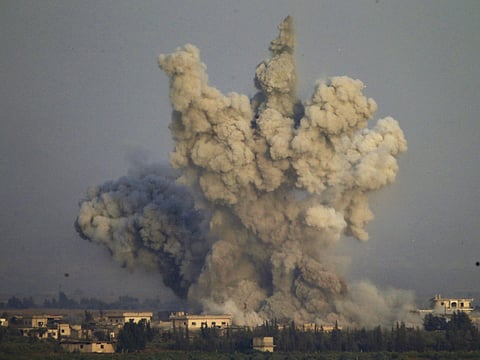How the Syrian-Kurdish deal came into being
Realisation has fast dawned that there were limits on how far America was willing to go in Syria

A Syrian-Kurdish agreement is in the works, after the US-backed Syrian Democratic Forces (SDF) realised that there were limits to how far Americans were willing to stand up for them on the Syrian battlefield. Although still recipients of US funds, with $300 million (Dh1.1 billion) allocated to Kurdish fighters in the Pentagon’s 2019 budget, the Kurdish feel that their US blanket is becoming increasingly thin, especially that the funds still require Congressional approval, which might not come.
The SDF also feels that the Americans are going to withdraw from the Syrian north-east shortly, based on a recent announcement made by US President Donald Trump. If that happens, possibly by next November, a joint force of Syrian and Russian troops — perhaps even Turkish ones as well — will undoubtedly march on Kurdish cities and towns east of the Euphrates River, dismantling whatever limited statehood they have enjoyed since 2012.
A senior SDF delegation visited Damascus in late July, proposing a negotiated surrender, with maximal face-saving for the Kurds. It was a ground-breaking visit, surprisingly announced by the Kurds themselves, rather than the Syrian government. The only mention of it in state-run media was in the Damascus daily Al-Thawra, composed of two lines only, saying that “de-centralisation was not discussed.”
Separation, autonomy, of federal rule were not on the table. What was discussed was the return of government services to the Kurdish territories, from electricity and water to schools, hospitals, and the civil registrar that includes all birth, marriage and death certificates, which government troops had shipped off to Damascus back in 2012.
In exchange, the SDF proposed sending troops to take part in the battle of Idlib in the Syrian north-west, presently in the hands of Turkish militiamen and their Syrian proxies. They also suggested relinquishing control of Al Raqqa, the former capital of the so-called Islamic State of Iraq and the Levant or Da’esh (liberated by the Kurds in October 2017), and Al Hassakeh, held by them since 2012.
The official response in Damascus was that all territories ought to return to government control and not just Al Raqqa, which is in complete ruin, and Al Hassakah, where approximately 40 per cent of it remains in the hands of government troops, who hold its Palace of Justice, the government’s headquarters, and chunks of its main bazaars. The same applies to Al Qamishly, which still has an entire quarter held by the Syrian Army, and includes all intelligence agencies and the city’s only airport.
In addition to Al Qamishly, Al Hassakeh, and Al Raqqa, the regime wants the countryside of Deir Al Zor, Al Malkiyah, and Manbij, west of the Euphrates.
No agreement was reached on what to do with Kurdish weapons, with the Kurds peddling them as “vital” for any future battles against Daesh. In other territories were reconciliation agreements were reached, militiamen had to surrender their arms in-full, and either join the Russian-led process or get shipped off to faraway territories.
The Kurds are demanding that they get to stay in their towns and villages, similar to what was offered to the residents of Dara’a in the Syrian south last July. Also, there was no response to a Kurdish suggestion on sharing their territory’s wealth with Damascus (previously a taboo topic) although the government has seemingly agreed to let them have their schools, use their language, and elect a municipality and governor, rather than have them appointed by Damascus.
Architects of this agreement — if it pulls through — are Russian officers at the Hmeimeem airbase off the Syrian coast. Since entering the Syrian battlefield three years ago, they have always resorted to force only when peaceful settlements hit a brick wall, unlike the Iranians, who were always in favour of using force, rather than statesmanship, to achieve their goals in Syria.
President Vladimir Putin realises that Trump has finally decided to take sides with Turkey in its open battle with the Kurds. Standing on middle ground or continuing to embrace the Kurds at Turkey’s expense was no longer possible, threatening a full-fledged Turkish defection into the arms of the Russians. This would severely harm US interests in the Middle East and be extremely painful for the North Atlantic Treaty Organisation (Nato), where Turkey remains a ranking member.
That, explains Trump’s decision to walk-out on Syria, along with the fact that he was taken aback by their poor performance in Afrin last February. It is also the reason why Putin is in a hurry to march into territory left vacant by the Americans.
The Kurds for their part are showing high-grade pragmatism, driven by a strong survival instinct. Any foolishness on their part will undoubtedly lead to a military confrontation with the Syrian Army, one that would destroy their cities and towns, just like East Ghouta. Either way, it will lead to a regime victory, prompting them to take the smarter, shorter, yet less psychologically difficult route of reaching a compromise with Damascus, saving lives and homes, instead of imaginary political ambitions.
Sami Moubayed is a Syrian historian and former Carnegie scholar. He is also author of Under the Black Flag: At the frontier of the New Jihad.
Sign up for the Daily Briefing
Get the latest news and updates straight to your inbox



